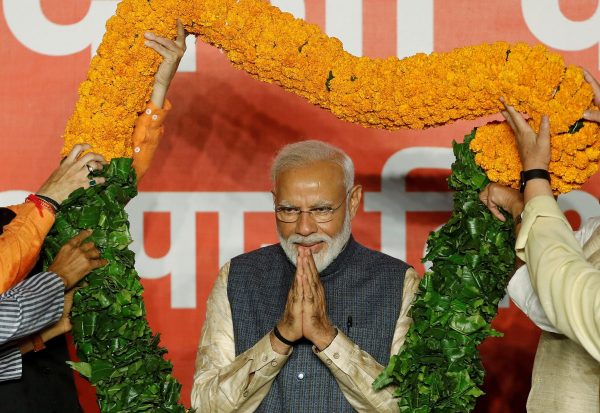It is possible to make some informed inferences on the likely course of his foreign policy based upon his record of the past five years, his new Cabinet appointments and the nods that he made at his swearing-in ceremony. It is also possible to outline some areas where he will be forced to make some critical choices and confront some important tensions in the conduct of India’s foreign policy.
Modi proved to be a remarkably peripatetic prime minister during his first five years in office. He travelled to 55 countries and made 48 foreign trips. Not since former prime minister Jawaharlal Nehru has an Indian prime minister demonstrated a similar interest in and commitment to foreign policy.
Modi cemented India’s relationship with the United States by deftly building on the accomplishments of the previous two United Progressive Alliance regimes. He also moved to build a personal rapport with Israeli Prime Minister Benjamin Netanyahu. It is remarkable that Modi managed to forge a close relationship with Israel while simultaneously ensuring cordial relationships with Iran, Saudi Arabia and the smaller Gulf sheikhdoms.
While these can be seen as successful ventures, his policies toward Pakistan, China and some of India’s smaller neighbours proved less impressive.
In September 2014, Modi invited Chinese President Xi Jinping to New Delhi. This visit was high on fanfare and laden with the promise of increased Chinese investment. But some People’s Liberation Army (PLA) incursions into Ladakh in Jammu and Kashmir marred the visit. This infelicitous episode reminded Modi and his foreign policy team that economic diplomacy alone could not solve the enduring Sino-Indian strategic rivalry. Indeed in his second term Modi may have to undertake efforts to deal with the yawning trade gap in Sino-Indian relations.
Modi had sought to reach out to both of India’s long-standing adversaries by including Prime Minister Nawaz Sharif of Pakistan and other heads of state of the South Asian Association for Regional Cooperation at his swearing-in ceremony in 2014. Relations with Pakistan then deteriorated during much of Modi’s term in the wake of a series of terrorist attacks tracing back to Pakistani soil. In September 2016, the Indian government publicly announced that it had carried out a set of ‘surgical strikes’ against what it referred to as ‘terrorist launching pads’ in Pakistan-controlled Kashmir. This was in retaliation to terrorist attacks originating from Pakistan on Indian soil.
Pakistani Prime Minister Imran Khan assumed office in 2018 but it made no material difference to the India–Pakistan relationship. The terrorist attacks continued and India carried out a bold retaliatory air strike across the international border in February 2019.
Modi has appointed Subrahmanyam Jaishankar, a former foreign secretary, as his Minister of External Affairs, a Cabinet level position. Jaishankar is believed to have enjoyed an excellent rapport with Modi during his tenure as the foreign secretary. He is likely to pursue the current tough stance toward both China and Pakistan.
A vital new political appointment suggests that the tough policy toward Pakistan is unlikely to change. It is reasonable to make this inference as Jaishankar was the foreign secretary during the time of the ‘surgical strikes’ against Pakistan. It is entirely likely that he reinforced the hardline instincts of Ajit Doval, the National Security adviser, who was also primarily responsible for policy toward Pakistan. He also adopted an unyielding stance toward China during a crisis along the Bhutan–India–China trijunction at Doklam in 2017.
Beyond dealing with its immediate neighbours, how is India likely to deal with other key relationships, such as that with the United States? Modi’s past record suggests it is likely that he will seek policy continuity. This may pose a challenge for India’s foreign policy as he will still be dealing with a mercurial leader — US President Donald Trump. As part of Trump’s escalating trade war, he ended India’s preferential trade status. Trump undertook this drastic action even as India sought to end its dependence on Iranian oil, a matter which had been a high priority for the Trump administration. Managing India’s relationship with Iran while maintaining good relations with the United States will prove to be a key challenge for Modi and his team in their second term.
If Modi’s decision to invite the leaders of Bangladesh, Myanmar, Sri Lanka, Thailand, Nepal and Bhutan to his inauguration is any indicator, India will also re-double its focus on its ‘Act East’ policy toward Southeast Asia in an effort to counter the growing reach of China in the region. It is reasonable to surmise that the strategic partnership that has been forged with Japan, for the same reasons, will be sustained. Whether Modi’s regime will finally dispense with the vacillating attitude that has characterised India’s relations with the ‘Quad’ — the maritime cooperation arrangement involving Australia, Japan, the United States and India — remains to be seen.
These may prove to be the preferred choices of the second Modi administration. As Trump’s abrupt decision of last week demonstrated, the external world has a way of playing havoc on the best-laid plans. These unanticipated challenges that Modi and his foreign policy team will confront will test the dexterity and nimbleness of the country’s foreign policy apparatus.
Sumit Ganguly is a Distinguished Professor of Political Science and holds the Tagore Chair in Indian Cultures and Civilizations at Indiana University, Bloomington. He is currently an Alexander von Humboldt Fellow at the University of Heidelberg, Germany.


While Modi may fight a rear guard against total capitulation, I see no option now for an India weakened by seventy years of suicidal anti national policies beginning with the Constitution other than to join the US bloc. China and it protege Pakistan are clear and present dangers to India and Russia has veered very close to China in reaction to hostile US actions